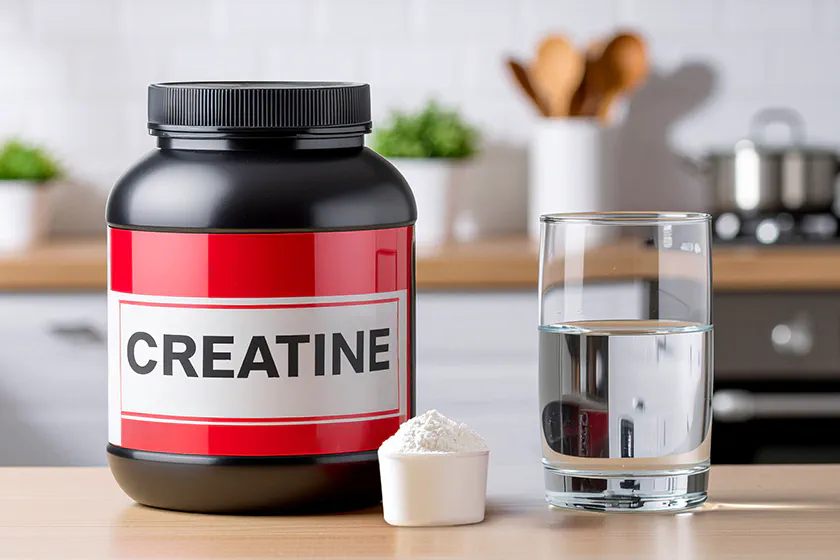Creatine: What It Is, When to Take It, and Why It Works

When it comes to building muscle and improving physical fitness, creatine is one of the most popular supplements on the market. It’s a great tool for supporting muscle growth, enhancing exercise performance, and speeding up recovery.
In this article, we’ll explore what creatine is, how it works, its benefits, when to take it, and whether it’s the right supplement for your goals.
What is Creatine?
Creatine is a naturally occurring amino acid that is primarily found in your muscles and brain. While your liver, pancreas, and kidneys produce about 1 gram of creatine per day, most people obtain additional creatine through dietary sources like red meat and seafood, or via supplementation.
Creatine’s primary role is in the production of cellular energy, particularly in the form of adenosine triphosphate (ATP). ATP is the main energy source used by muscle cells during high-intensity, short-duration movements like weightlifting, sprinting, or jumping.
Benefits of Creatine
Creatine offers a wide range of benefits, especially when it comes to fitness performance and muscle growth. When consumed, creatine is transported to the skeletal muscles, where it is stored as phosphocreatine. This high-energy compound helps produce ATP, the primary fuel source for muscle contractions during short bursts of intense activity.
During high-intensity exercises like sprinting or heavy lifting, phosphocreatine is rapidly converted into ATP, providing an immediate burst of energy. This allows individuals to train harder, lift heavier, and perform more reps, which, over time, can lead to greater gains in strength and muscle mass.
When the body depletes its natural creatine stores, muscle fatigue and soreness are more likely to set in. Supplementing with creatine increases the amount of phosphocreatine available in muscles, helping to delay fatigue, reduce soreness, and enhance workout performance.
In addition to boosting energy production, creatine also:
- Supports Muscle Growth – By allowing you to train more effectively and at higher intensities, creatine indirectly promotes increased lean muscle mass over time.
- Improves Recovery – Research suggests creatine may help reduce muscle damage and inflammation, leading to faster recovery between workouts.
- __Hydrates Muscle Cells __– Creatine draws water into muscle cells, creating a state of cell volumization that may help signal muscle growth.
- Boosts Brain Function – Emerging evidence shows creatine may support cognitive performance, especially during periods of stress or sleep deprivation.
- __Helps with Healthy Aging __– Creatine may support muscle preservation and strength maintenance in older adults, helping to combat age-related muscle loss.
When To Take Creatine
Creatine can be taken at any time of the day. However, most people choose to use it as a pre-workout, during a workout, or as a recovery supplement to maximize its benefits. Some people prefer to take it before exercise to help boost their energy levels and improve their performance during their workout. Others may opt to take it during their workout to enhance their endurance and reduce fatigue. Taking creatine post-workout can speed up the recovery process and support muscle growth.
Is Creatine Safe?
Yes—creatine is considered very safe for healthy individuals when taken in recommended amounts. It’s one of the most studied supplements in the world and has shown no long-term adverse effects when used appropriately.
Some people may experience temporary water retention or mild digestive discomfort, but these side effects are usually manageable by spreading out the dose or taking it with food.
Stay hydrated while taking creatine, as it draws water into your muscle cells and may increase your body’s need for fluids.
Who Should Take Creatine?
Creatine is beneficial for a wide range of people, including:
- Strength athletes (Crossfitters, weightlifters, powerlifters)
- Sprinters and high-intensity interval trainers
- Anyone looking to gain muscle or improve performance
- Those interested in the potential cognitive benefits
- Older adults who are interested in preserving muscle mass and strength
Can You Take Creatine With Protein?
Yes, you can certainly take creatine and protein supplements together! It is safe and effective to combine the two to support your workout goals. In fact, many people take both supplements together to enhance their performance. Combining creatine and protein can provide a synergistic effect, as creatine helps to increase exercise capacity and give energy to the muscles, while protein provides the essential amino acids that the body needs to build and repair muscle tissue.
The Bottom Line
Creatine is an effective and well-researched supplement that supports muscular energy, athletic performance, and endurance. Whether you’re aiming to build lean mass, increase workout intensity, or simply feel stronger and more energized during exercise, creatine may be a good option for you.
For best results, take creatine consistently, stay hydrated, and pair it with a balanced diet and training program. As always, if you have pre-existing health concerns or are unsure if creatine is right for you, talk to your healthcare provider or a registered dietitian.
Jordana Tobelem, RD, LDN, is a Registered Dietitian passionate about empowering individuals to reach their full potential through nutrition education. Drawing on her clinical dietetics background, she offers consulting services to a variety of healthcare brands and organizations. Jordana stays up to date with the latest nutrition research to develop impactful content for her clients. She holds dual academic degrees in Business and Dietetics.



